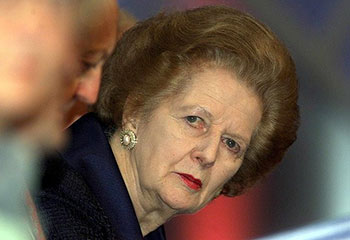Margaret Thatcher, the “Iron Lady” who transformed Britain and inspired conservatives around the world by radically rolling back the state during her 11 years in power, died on Monday following a stroke. She was 87.
Britain’s only woman prime minister, the unyielding, outspoken Thatcher led the Conservatives to three election victories, governing from 1979 to 1990, the longest continuous period in office by a British premier since the early 19th century.
A grocer’s daughter with a steely resolve, she was loved and loathed in equal measure as she crushed the unions, privatized vast swathes of British industry, clashed with the European Union and fought a war to recover the Falkland Islands from Argentine invaders.
Thatcher died peacefully on Monday morning at the Ritz hotel after a stroke. She had been in poor health for months and had declined into dementia in her final years.
“It’s very sad to hear of her death but her legacy and death are two different things. Politically, she did not leave a good legacy for the working class,” Kevin Robertson, a 39-year-old garage manager, told Reuters in Edinburgh.
Some opponents said on social media that they would hold a party to celebrate her death while a website set up to ask if Thatcher was dead had received 170,000 likes by midday.
The Soviet defense ministry newspaper Red Star dubbed Thatcher the “Iron Lady” .
Others who crossed her path, particularly in Europe, were subjected to withering diatribes often referred to as “handbaggings”, named after the black leather bag she invariably carried.
Her personal credo, founded on competition, private enterprise, thrift and self-reliance, gave birth to a political philosophy known as “Thatcherism”.
In a few tense weeks at the end of 1990, Thatcher fell from power as some of her most senior ministers turned on her in what she said later was treachery.
“Her memory will live long after the world has forgotten the grey suits of today’s politics,” said London Mayor Boris Johnson.
M.D

